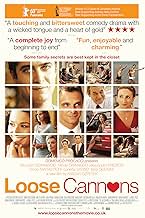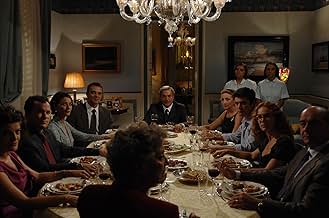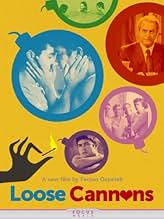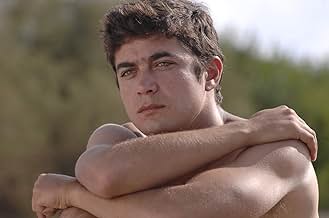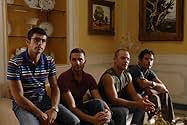CALIFICACIÓN DE IMDb
7.2/10
14 k
TU CALIFICACIÓN
Tommaso, el pequeño de los Cantones, una familia italiana tradicional del sur de Italia, decide contarles a sus padres que tiene novio.Tommaso, el pequeño de los Cantones, una familia italiana tradicional del sur de Italia, decide contarles a sus padres que tiene novio.Tommaso, el pequeño de los Cantones, una familia italiana tradicional del sur de Italia, decide contarles a sus padres que tiene novio.
- Dirección
- Guionistas
- Elenco
- Premios
- 34 premios ganados y 34 nominaciones en total
- Dirección
- Guionistas
- Todo el elenco y el equipo
- Producción, taquilla y más en IMDbPro
Opiniones destacadas
I saw this movie at the Chicago International Film Festival, along with 18 other movies, and it was, by far, the best movie in the festival. It was the only movie I attended that was applauded by the audience at the end of the film. I see that one of the film critics commented that the film was uneven because it couldn't make up its mind whether it was a comedy or a drama. It was both and worked on both levels, which is one of the reasons I loved it. it made me laugh and it made me cry. I think the best art is often like that. Gabriel Garcia Marquez' book "100 Years of Solitude" and Joseph Heller's "Catch 22" are examples of books that are very funny and very sad, sometimes for exactly the same reasons. I hope this film will be nominated for an Academy Award for Best Foreign Language Film. It deserves the recognition.
Ferzan Ozpetek's affection for his characters is truly contagious. A bunch of assorted family members exchange publicly or privately some of their own personal truths. I sat at a Roman movie house with a loving public that not merely followed Ozpetek's world but also became part of it. Riccardo Scamarccio's beautiful face observes and reacts to his own existential dilemma. We're with him even if we can't totally understand his fears. We are in a world that's grown considerably in the last few years but the problematic seems to belong to another era. The father is a bit of a reactionary monster with a very human face. Loved the grandmother, a superlative Ilaria Occhini and the complicated aunt in a wonderful creation by Elena Sofia Ricci.
Juxtaposing with other Ozpetek's films I have watched (chronically STEAM: THE Turkish BATH 1997, LAST HAREM 1999, THE IGNORANT FAIRIES 2001, FACING WINDOWS 2003, SATURN IN OPPOSITION 2007), this time Ozpetek is palpably much smoother and more effortless to deal with his gay-oriented hallmark, shunning from all the melancholy and narcissism most homosexual films shamelessly over-exploit.
This film is struggling to overthrow FACING WINDOWS from the crown of my favorite Ozpetek's work (I do need a fresh re-watch of STEAM though). I do not dare to spoil anything here, one prominent astonishment comes at the near end, when the camera fluidly couples with different times, emanates a wonderful visual and spiritual poignancy which exactly one would love to experience from watching a decent film!
The cast may not be perfectly splendid, but every character is worth of some acknowledge for its ensemble undertaking, in particular for Ilaria Occhini (the grandmother in the film), a royal poise exuding from her own dignity, which counter-balances the dramatic banality of the coming-out-of-the-closet plight (namely a shade abominable presence of Ennio Fantastichini). Our leading man Riccardo Scamarcio (from THREE STEPS OVER HEAVEN 2004) may be in lack of a certain gay temperament as the chemistry between him and an irresistibly alluring Nicole Grimaudo is way more tangible here.
The comedy part in the film is somewhat showy but properly amusing; the intermittent interruption of grandma's marriage is adorably empathetic, also I cherish the balmy score (from Pasquale Catalano) and the moot ending which insinuates a positive perspective of the philosophy of our beings.
The blatant snub of 2011 Davide di Donatello awards (only one nomination for BEST MUSIC) is atrociously staggering in my opinion, but it will not stop Ozpetek from coming to be among the most promising virtuoso in the contemporary Italian cinema.
This film is struggling to overthrow FACING WINDOWS from the crown of my favorite Ozpetek's work (I do need a fresh re-watch of STEAM though). I do not dare to spoil anything here, one prominent astonishment comes at the near end, when the camera fluidly couples with different times, emanates a wonderful visual and spiritual poignancy which exactly one would love to experience from watching a decent film!
The cast may not be perfectly splendid, but every character is worth of some acknowledge for its ensemble undertaking, in particular for Ilaria Occhini (the grandmother in the film), a royal poise exuding from her own dignity, which counter-balances the dramatic banality of the coming-out-of-the-closet plight (namely a shade abominable presence of Ennio Fantastichini). Our leading man Riccardo Scamarcio (from THREE STEPS OVER HEAVEN 2004) may be in lack of a certain gay temperament as the chemistry between him and an irresistibly alluring Nicole Grimaudo is way more tangible here.
The comedy part in the film is somewhat showy but properly amusing; the intermittent interruption of grandma's marriage is adorably empathetic, also I cherish the balmy score (from Pasquale Catalano) and the moot ending which insinuates a positive perspective of the philosophy of our beings.
The blatant snub of 2011 Davide di Donatello awards (only one nomination for BEST MUSIC) is atrociously staggering in my opinion, but it will not stop Ozpetek from coming to be among the most promising virtuoso in the contemporary Italian cinema.
Loose Cannons (Mine vaganti) is a beautiful movie about a young gay man in a large, loving and eccentric Southern Italian family. His plan to free himself from the family pasta business by coming out as gay misfires early in the movie, and the remaining ninety minutes cover how his dilemma is resolved.
But this is far, far more than a coming-out movie. Themes of life and death and family and love and loss and immortality run like deep, rich rivers of life throughout the story; it is astonishing how much emotional ground is covered so effectively and gracefully in so little time. Each one of the dozen or so highly differentiated characters is fully and richly developed, and not one of them is short-changed or stereotyped.
I bought Loose Cannons because I have loved the earlier works of Ferzan Ozpetec, particularly His Secret Life (Le fate ignoranti), Facing Windows (La finestra di fronte), Sacred Heart (Cuore sacro), and - most of all - Saturn in Opposition (Saturno contro), but Loose Cannons surpasses them all. Each of its predecessors had minor flaws and occasional weak moments, but Loose Cannons has none.
As usual in his movies, photography, sets and music are highly original and perfectly fitted to the story: if it were a silent movie it would be beautiful just to look at; if it were a radio program it would be delightful just to listen to. This is the first of his movies to integrate a significant amount of comedy into his usually serious but highly imaginative dramas, and he does it expertly; I laughed out loud almost as often as I wept with delight.
This movie is a masterpiece. I cannot imagine how a better movie could ever be made; but Ozpetec is young still, so I am confident he will do it somehow. I can say without any reservation at all that this is the best movie I have ever seen.
But this is far, far more than a coming-out movie. Themes of life and death and family and love and loss and immortality run like deep, rich rivers of life throughout the story; it is astonishing how much emotional ground is covered so effectively and gracefully in so little time. Each one of the dozen or so highly differentiated characters is fully and richly developed, and not one of them is short-changed or stereotyped.
I bought Loose Cannons because I have loved the earlier works of Ferzan Ozpetec, particularly His Secret Life (Le fate ignoranti), Facing Windows (La finestra di fronte), Sacred Heart (Cuore sacro), and - most of all - Saturn in Opposition (Saturno contro), but Loose Cannons surpasses them all. Each of its predecessors had minor flaws and occasional weak moments, but Loose Cannons has none.
As usual in his movies, photography, sets and music are highly original and perfectly fitted to the story: if it were a silent movie it would be beautiful just to look at; if it were a radio program it would be delightful just to listen to. This is the first of his movies to integrate a significant amount of comedy into his usually serious but highly imaginative dramas, and he does it expertly; I laughed out loud almost as often as I wept with delight.
This movie is a masterpiece. I cannot imagine how a better movie could ever be made; but Ozpetec is young still, so I am confident he will do it somehow. I can say without any reservation at all that this is the best movie I have ever seen.
Bravo for Ivan Cotroneo, the talented translator of Cunningham and Kureishi, among other evident skills, and for Fernan Ozpetek, the only Italian director (though he happens to be Turkish by birth) who regularly and reliably features positive gay characters in his films. In an Italy that, at least as issues of sexual identity and respect for difference are concerned, has just barely crossing the threshold of the 1980s, Ozpetek is a rarity and a treasure. The first two-thirds of Mine Vaganti (Loose Cannons) will seem dated to anyone familiar with the last 30 years of queer representation in American cinema, as will the melodramatic, end-of-the-world reaction of Tommaso's father to learning that his son is gay, but the last third hits all the right dramatic and emotional notes and redeems any doubts one might have about the rest. There are some outstanding performances here: Ilaria Occhini as Tommaso's grandmother, and the gorgeous Nicole Grimaudo as the disconsolate and complex Alba. In fairness, I even have to throttle back some of my knee-jerk dislike for Scamarcio. It's not that he's a standout here, but playing a gay character is still a brave move in Italian cinema, especially for an actor who still depends on teen-heartthrob roles for his bread-and-butter. He's certainly no more or less believable as a gay man than are any of the other actors in the film, though even that's a throwback to the days when U.S. cinema divided representations of gay men between "normal," masculine gays (Tommaso—who may be gay, but still knows how to play soccer—his boyfriend, and his brother) and the "sassy gay friends" who are frivolous and effeminate and whose only purpose is to provide comic relief. Still, Mine Vaganti is a giant step forward and a welcome and charming antidote to government silence and Vatican-inspired hate speech.
¿Sabías que…?
- ConexionesRemade as Quem Vai Ficar com Mário? (2021)
Selecciones populares
Inicia sesión para calificar y agrega a la lista de videos para obtener recomendaciones personalizadas
- How long is Loose Cannons?Con tecnología de Alexa
Detalles
Taquilla
- Total a nivel mundial
- USD 15,340,429
- Tiempo de ejecución1 hora 50 minutos
- Color
- Mezcla de sonido
- Relación de aspecto
- 2.35 : 1
Contribuir a esta página
Sugiere una edición o agrega el contenido que falta

Principales brechas de datos
What is the Canadian French language plot outline for Una familia muy normal (2010)?
Responda


